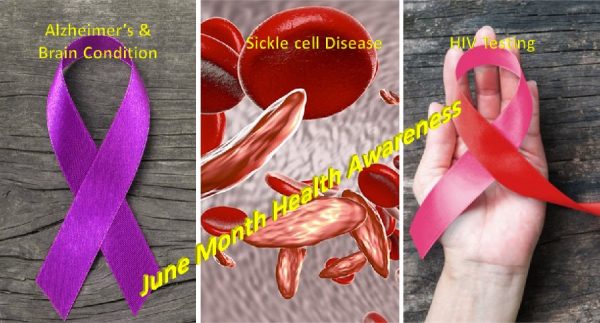
June 2020 Health Observances
While we are all trying to be safe from COVID-19 pandemic, we must not forget about the other illnesses that affecting millions of lives. Each year WHO & NHO dedicated June month to create awareness and help spread the word about Alzheimer’s and Brain conditions, Sickle cell disease and HIV testing.
Alzheimer’s and Brain awareness: Alzheimer’s disease was 6th leading cause of death among adults in the year 2014. When we say adults, it is age group between 18 years and older based on death certificate data from Chicago Health and Aging Project data suggests that dementia is prevalence among adults aged 65+ years in US alone. Dementia affects health, ability to live independently and quality of life. Alzheimer’s and dementia will affect a person’s ability in:
- Managing financial decisions
- Managing medical conditions and medications
- Driving independently
- Handling tools
- Social life
- Daily activities such as eating, bathing or dressing
Worldwide, Alzheimer’s disease is leading cause of disability. When we visit nursing home and elderly care, we can see many elders who are in this status. The challenge is to offer medical and support services and often long- term care for elderly. These challenges can take toll not only on the person who is suffering from the condition, also on others including family, society and caregivers-emotionally, physically and financially. What are the steps we can take to improve, care and support those people with dementia and caregivers? According to healthypeople.gov:
- Making existing effective diagnostic tools availability more
- Reducing severity of cognitive and behavioral symptoms
- Supporting caregiver’s family with social and legal resources
- To reduce co-occurring disorders, encourage healthy behaviors in individuals
- To reduce number of seniors with undiagnosed dementia
World sickle cell day: June 19th is designated as World Sickle cell Awareness day is observed. It is to raise awareness and increase knowledge about sickle cell disease. It is commonly known as sickle cell anemia It is an inherited red blood cell disorder with lack of healthy RBC to carry oxygen throughout the body. RBC in these individuals are crescent moon or sickle shaped and they get stuck in small blood vessels causing blockage or slow blood movement with less oxygen into the parts of the body. Sickle cell is common among African Americans, Indians, Mediterranean, Latinos and Middle Eastern people. Every year there are 300,000 babies are born with the disease.
There is no cure for the disease, and it is often discovered at birth during routine screening of baby. Treatment options depends on the severity of symptoms. The only cure for the disease is a bone morrow or stem cell transplant and these treatments comes often with risks. Sickle Cell Disease Educational Information Repository (SCD Repository) was developed to screen Newborn for the disease. It provides recruitment, care coordination, education and outreach to individuals living with sickle cell disease and help families.
National HIV Testing Day: On June 27th National HIV Testing Day is observed. It encourages people to get tested for AIDS (HIV), know their status and encourages to get treatment if needed. The only way to know if someone has HIV is to get tested for the virus. All pregnant women and everyone who ages 15 to 65 needs to get tested for HIV. One can request in doctor’s clinic for either a confidential or anonymous HIV testing. Talk to your doctor today to understand more about HIV test.
Even though there is no specific data or information, this year it is very critical for millions to undergo this test, with Covid-19 risk. Older adults who are living with any preexisting conditions are at higher risk of severe illness. The risk for people with HIV getting very sick is greatest in
- People with low CD4 cell count
- People who are not on HIV treatment.
On National HIV testing day people with HIV or who think that they might have HIV, should get tested and seek proper treatment to avoid any COVID-19 complications.
References:
Author: Sumana Rao | Posted on: June 1, 2020
« Immune and Overall Health Boosting Herbal Powders Returning To Work Post Covid-19? Do’s And Don’t »






















Write a comment